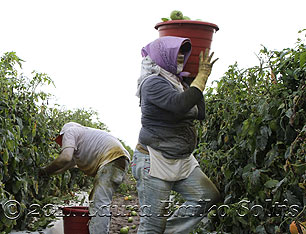
Article details “extraordinary agreement with local tomato growers and several big-name buyers” …
Following its strongly positive December editorial on the CIW’s agreement with the Florida Tomato Growers Exchange (“One Penny More a Pound,” 12/5/11), The New York Times today ran a more in-depth article on the new accord. Here below are two extended excerpts, but you can find the article in its entirety here:
After fighting for more than a decade for better wages, a group of Florida farmworkers has hashed out the final piece of an extraordinary agreement with local tomato growers and several big-name buyers, including the fast-food giants McDonald’s and Burger King, that will pay the pickers roughly a penny more for every pound of fruit they harvest…
… Though the hamburger chains and others agreed to the increase years ago, the money they have been paying — an estimated $2 million now held in an escrow account — could not be distributed to tomato pickers until the state’s largest trade association, which acts as a middleman, agreed to lift a ban preventing their farms from passing along the extra wages.
That happened in November, when the farmworkers’ group, the Coalition of Immokalee Workers, and the Florida Tomato Growers Exchange, a trade association, completed details of a code of conduct that included not only the wage improvement but also guarantees of increased workplace protections — like minimum-wage guarantees and a zero tolerance policy on forced and child labor — for the laborers…
… Cruz Salucio, a member of the Coalition of Immokalee Workers, said the agreement had created a new feeling of respect between workers and growers.
“In the past, the companies would shift blame to the contractors and wipe their hands clean of any complaints of abuse,” Mr. Salucio said. “With these agreements, the growers have to work with us, and the workers can report abuses without fearing reprisals.”
The article continues:
At least nine major buyers — including the Whole Foods Market supermarket chain, as well as McDonald’s and Burger King — have been paying the penny-per-pound price increase. Still, some in the industry worry, the unusual agreement could be undermined if enough buyers turn to competitors in California and Mexico willing to sell tomatoes at a cheaper price.
“We hope that socially responsible businesses will purchase tomatoes from our growers and not cheaper tomatoes from Mexican farm competitors,” said Reggie Brown, executive vice president of the Florida Tomato Growers Exchange, a trade association that represents 80 percent of the state’s tomato farmers. “Everybody in the system has to be invested for it to work.”
Whole Foods supported the coalition because helping laborers earn a better wage was in line with the company’s core values and did not cost much, said Karen Christensen, a regional vice president.
“The impact of the penny per pound is a minimal addition to our purchase,” Ms. Christensen said. “We have not seen a noticeable impact on the consumer.”
Maisie Greenawalt, vice president of the catering company Bon Appétit, which serves hundreds of colleges in the United States, said her company was paying more for tomatoes because it had a policy to work with agricultural companies that follow ethical practices.
“Having a food system that keeps prices artificially low by enslaving workers is not acceptable,” Ms. Greenawalt said.
But not everyone is on board. Maria Brous, a spokeswoman for Publix Super Markets, based in Lakeland, Fla., said the extra money farmworkers want to be paid should come from the growers who employ them.
As the article makes abundantly clear, we are on the cusp today of an unprecedented transformation of farm labor conditions in Florida’s tomato fields, but the pace, depth, and breadth of that transformation will ultimately depend on the participation of all the major purchasers of Florida’s tomatoes. In the words of the FTGE’s Reggie Brown, “Everybody in the system has to be invested for it to work.”
And that is where you — the consumer — come in.
Everybody is not today invested in the Campaign for Fair Food. In fact, despite widespread support for the innovative, collaborative solution at the heart of the Campaign, companies like Publix and Ahold continue to stubbornly refuse to do their part, denying Florida’s workers the full potential of the change that is today underway. The fast-food and foodservice industries are largely on board. The only remaining obstacle, the last industry standing in the way of this long-awaited, urgent change, is the supermarket industry.
The supermarkets refuse to be part of the solution, and so they have become the problem.
You can change that. Join us this February 27th in Boston and March 5th in Tampa as we take to the streets to demand that Ahold (owner of the Stop & Shop and Giant grocery chains) and Publix do the right thing and support the Campaign for Fair Food.
Maisie Greenawalt of the foodservice company Bon Appetit put it perfectly: “Having a food system that keeps prices artificially low by enslaving workers is not acceptable.” If you agree with that simple statement, now is the time for you to take action.
